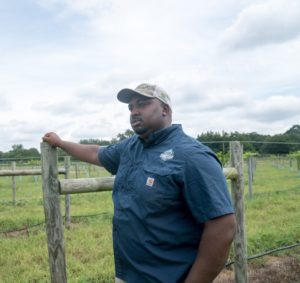While the U.S. legacy of historic and systemic discrimination against Black Americans is well-known in housing, education, healthcare, and employment, the ways in which Black farmers have been discriminated against is less widely known. In fact, discrimination in agriculture policies have contributed as much as $300 billion to the ongoing and persistent wealth gap of more than $10 trillion between Black and white Americans. Rather than assisting Black Americans to become farmers and landowners after two centuries of legal enslavement, the U.S. Department of Agriculture (USDA) denied them timely loans, made them jump through hoops that white farmers did not face, forced them into foreclosure, and in some cases even directly colluded with banks and developers to steal their land.

Davon Goodwin, a first generation young Black farmer grows grapes and mixed vegetables for his North Carolina community. However, student and farm loan debt is making it challenging to expand his operation.
To address this long legacy of loss as a result of institutional discrimination, Senators Raphael Warnock (D-GA) and Cory Booker (D-NJ) introduced the Emergency Relief for Farmers of Color Act in Congress in February, both to pay off outstanding loan debt due to USDA bias and to respond to the hardships of the COVID-19 pandemic. The measure was included in the March American Rescue Plan (ARP), with $4 billion allocated for debt relief, along with another $1 billion for outreach and education.
However, even as tens of thousands of farmers of color are set to receive checks, white farmers in at least five states (WI, TX, WY, FL, TN), backed by right-leaning legal firms, have filed lawsuits against the Biden Administration and USDA, claiming that the program discriminates against white farmers. Last month, a U.S. district court judge in Florida issued a preliminary injunction against the payments being dispersed, putting the debt relief on hold indefinitely.
U.S. farm policy has always favored not only white farmers, but larger and more capitalized operations, including corporations. The 1862 Homestead Act gave parcels of land that had been cleared of its Indigenous inhabitants to white settlers, but much of that land went to speculators, railroads, and others who already had the capital to invest. Policy changes solidified during the Nixon Administration encouraged farmers to “get big or get out,” paving the way for the modern era of large-scale, input-reliant operations. Hundreds of thousands of family farms have “gotten out” in recent decades, unable to succeed given wildly fluctuating farm prices and increasingly concentrated markets.
Many family farmers are struggling in an unfriendly policy environment. Black farmers and other farmers of color face these challenges in addition to the long history of discrimination from institutions like the USDA. We need farm policy solutions that support diversified independent family farms of all types in feeding their communities—and we also need to acknowledge and repair the legacy of economic harm done to farmers of color that has put them at a much greater disadvantage.
SiX supports debt relief for Black farmers as a long-overdue step towards justice and equity—a small step in what will be a long road to recovery.
We have prepared a messaging guide to help legislators respond to lawsuits and the ongoing challenges faced by Black farmers. If you are a CROP member you can see the messaging guide here. Not a CROP member? As a state legislator you can join below.
We can also provide communications and other support around this issue, including help with op-eds, constituent communications, and ways to advance farmer equity legislation in your state. Reach out to us if you’d like assistance: [email protected]

